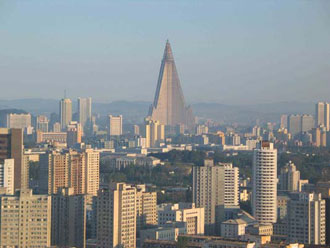The 8,000 artillery pieces, 2,000 tanks and 700,000 trigger-happy N. Korean soldiers placed within 60 miles of the DMZ ensures that the Kim Jong-Il regime will end with a bang rather than a whimper. The fireworks — be they ever so brief — will herald a scramble for a share of what will be the next half-century’s richest land rush.
North Korea occupies the geographical nexus between China, Japan, S. Korea and Russia, a region that produces a quarter of the world’s $72 trillion annual output. The erasing of the DMZ will trigger a rush of entrepreneurs and corporate executives seeking a foothold in the manufacturing, construction, transportation and investment sectors of an area that will enjoy the advantages of cheap, highly-educated N. Korean labor and location at the epicenter of the world’s biggest concentration of industrial centers and affluent consumers.
The resulting real estate boom alone will produce tens of thousands of new millionaires and billionaires in a land currently so miserable that even the children of upper-level cadres have begun joining the exodus of refugees to the South by way of China. The Northern boom will be fueled partly by the swift, assisted ascent of N. Korea’s 20 million impoverished virtual inmates to the South’s prosperous standard of living. It will also be fueled by hundreds of thousands of enterprising Southerners, Chinese and other foreigners rushing in with investment capital and world-class skills to exploit an economic vaccuum created by over a half century of bungled central planning.
The shell of a metropolis that is today’s Pyongyang will consume epic quantities of raw materials, equipment and expertise to satisfy the entrepreneurial activity that will turn it into another Seoul within a generation. With its unmatched geographical position and immense flat acreage, Pyongyang may even ultimately displace Seoul and even Tokyo, Hong Kong and Shanghai as East Asia’s leading economic hub.
Once N. Korea has become a bad historical memory, a unified Korea will for the first time in its history enjoy the benefits of being the geopolitical locus of the world’s four leading powers rather than suffering from their unwanted attentions.

